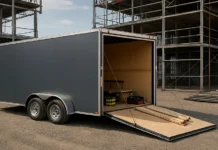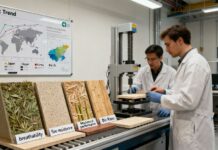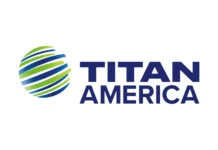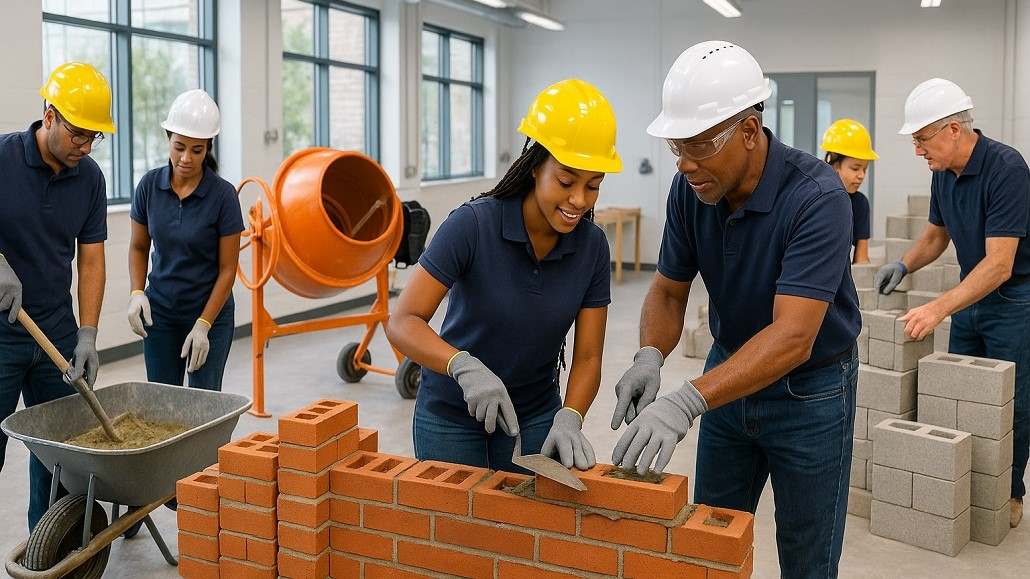Diversity & Workforce Development: Women, Allies & Career Growth in Masonry
The masonry and concrete trades are experiencing a transformative period as workforce development initiatives increasingly focus on diversity, inclusion, and expanded career pathways. With women comprising only 5-10% of the masonry workforce, significant opportunities exist to attract talented individuals who have been historically underrepresented in these trades. Forward-thinking companies and organizations are implementing comprehensive workforce development in construction programs that not only address critical labor shortages but create more dynamic, innovative, and productive work environments.
The Current Landscape and Opportunity
The construction industry faces an unprecedented workforce challenge, with skilled labor shortages affecting projects across all sectors. Traditional recruitment approaches have primarily targeted young men, leaving approximately half of the potential workforce largely untapped. This narrow focus has contributed to chronic labor shortages while overlooking the significant talents and perspectives that diverse workers bring to construction projects.
According to the U.S. Bureau of Labor Statistics, women now comprise about 10% of the overall construction workforce, with even smaller percentages in specialized trades like masonry. However, this representation is steadily increasing as educational opportunities, legal protections, and cultural attitudes continue to evolve. Organizations that proactively embrace workforce development in construction initiatives targeting underrepresented groups position themselves advantageously in competitive labor markets.
The economic benefits of diversified workforces extend beyond simply filling open positions. Research consistently demonstrates that diverse teams deliver superior problem-solving capabilities, enhanced creativity, and improved project outcomes. These advantages become particularly valuable in masonry and concrete work, where complex technical challenges benefit from varied perspectives and approaches.
Breaking Down Historical Barriers
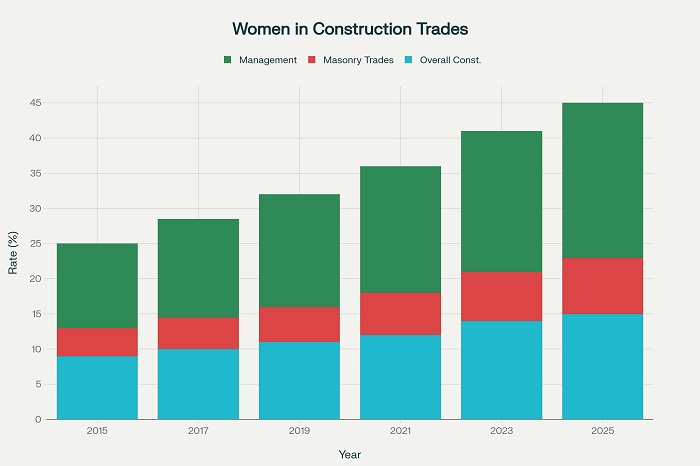
Addressing Systemic Challenges
Historical barriers to women’s participation in masonry trades have been both cultural and structural. Traditional apprenticeship systems often relied on informal networks and family connections that excluded women from consideration. Additionally, workplace cultures sometimes failed to provide supportive environments that enabled all workers to succeed.
Contemporary workforce development in construction programs specifically address these barriers through targeted recruitment, structured mentorship, and comprehensive support systems. Vocational schools and apprenticeship programs now actively recruit women through career fairs, partnerships with educational institutions, and community outreach initiatives that highlight opportunities in skilled trades.
The transformation of workplace cultures requires intentional effort and leadership commitment. Companies implementing successful diversity initiatives invest in training programs that promote inclusion, establish zero-tolerance policies for discrimination, and create advancement pathways that enable all workers to develop their careers effectively.
Educational and Training Innovations
Modern training programs recognize that effective workforce development in construction must accommodate diverse learning styles and backgrounds. Hands-on training approaches that emphasize skill development over traditional academic requirements often prove more effective for recruiting and retaining diverse workers.
Partnership programs between trade schools, community colleges, and employers create pathways that combine classroom instruction with practical experience. These programs often include support services including childcare assistance, flexible scheduling, and transportation solutions that address barriers commonly faced by non-traditional students.
Technology-enhanced training programs utilize virtual reality, online modules, and interactive simulations to provide engaging learning experiences that accommodate different learning preferences. These approaches can be particularly effective for attracting tech-savvy individuals who might not otherwise consider careers in traditional trades.
Creating Inclusive Work Environments
Mentorship and Support Systems
Successful workforce development in construction initiatives emphasize mentorship programs that pair experienced workers with newcomers to provide guidance, skill development, and career advancement support. These relationships prove particularly valuable for workers entering non-traditional careers, providing essential social support and professional development opportunities.
Formal mentorship programs establish clear expectations, provide training for mentors, and include accountability measures that ensure positive outcomes for both mentors and mentees. Many participants in these programs report that mentoring relationships enhance job satisfaction and career development for all involved parties.
Peer support networks create communities where workers can share experiences, address challenges, and celebrate successes. These networks often extend beyond individual companies to include industry-wide organizations that provide ongoing professional development and networking opportunities.
Workplace Modifications and Accommodations
Creating inclusive work environments often requires thoughtful modifications to traditional workplace practices and facilities. Simple changes including appropriately sized personal protective equipment, improved changing facilities, and ergonomic tool options can significantly improve workplace accessibility and comfort for all workers.
Flexible work arrangements that accommodate family responsibilities and personal commitments help retain valuable workers who might otherwise leave the industry. These arrangements can include flexible start times, job sharing opportunities, and family-friendly policies that support work-life balance.
The implementation of zero-tolerance policies for harassment and discrimination creates safe work environments where all employees can focus on their work without concern for personal safety or respect. These policies must be consistently enforced and supported by leadership to achieve their intended effectiveness.
Economic Benefits and Career Advancement
Competitive Compensation and Benefits
The skilled nature of masonry and concrete work commands competitive compensation that can provide excellent career prospects for workers at all levels. Entry-level positions often start above minimum wage levels, with experienced craftspeople earning salaries that compare favorably with many college-graduate positions.
Career advancement opportunities in masonry trades extend from apprentice positions through supervisory, project management, and business ownership roles. Construction managers and project coordinators can earn average salaries of $94,000 per year, while successful contractors and business owners often achieve even higher income levels.
Comprehensive benefits packages including health insurance, retirement plans, and professional development opportunities make masonry careers attractive to workers seeking long-term career stability and growth. These benefits often exceed those available in other industries with similar educational requirements.
Entrepreneurship Opportunities
The masonry and concrete trades offer exceptional opportunities for entrepreneurship and business ownership. The relatively low startup costs for small contracting businesses, combined with strong market demand for skilled services, create pathways for ambitious individuals to build successful enterprises.
Women-owned construction businesses have demonstrated exceptional growth rates and success levels, often achieving recognition for quality, innovation, and customer service. These businesses contribute to economic diversity while providing role models that encourage other women to pursue careers in construction trades.
Professional development programs that include business management training, financial planning, and marketing skills prepare workers for entrepreneurship opportunities while enhancing their value as employees. These skills benefit both individual career development and overall industry professionalism.
Industry-Wide Initiatives and Support
Professional Organizations and Networks
Organizations such as the National Association of Women in Construction (NAWIC) provide networking opportunities, professional development resources, and advocacy for women in construction trades. These organizations offer scholarships, mentorship programs, and career advancement support that benefit individual members while promoting industry-wide improvements.
Trade associations increasingly recognize the importance of diversity and inclusion initiatives, implementing programs that support recruitment, training, and advancement of underrepresented workers. These industry-wide efforts create momentum for change while providing resources that individual companies might not be able to develop independently.
Professional certification programs validate skills and knowledge while providing career advancement pathways. These certifications often enhance earning potential while demonstrating professional competence to employers and customers.
Educational Partnerships
Partnerships between industry organizations and educational institutions create pathways that introduce students to construction career opportunities while providing practical training experiences. These partnerships often include scholarship programs, internship opportunities, and job placement assistance that support successful career transitions.
High school career exploration programs expose students to construction trades before they make educational and career decisions. Early exposure helps dispel misconceptions about construction work while highlighting the technology, creativity, and problem-solving aspects that make these careers attractive to diverse individuals.
Community college programs that offer construction trades training often serve as bridges between traditional academic education and skilled trades careers. These programs can attract individuals seeking career changes while providing comprehensive training that prepares them for immediate employment.
Success Stories and Role Models
Individual Achievement Recognition
Highlighting successful women in masonry and concrete trades provides inspiration and demonstrates the viability of these career paths. Success stories that showcase career progression, professional achievements, and personal satisfaction help counter stereotypes while encouraging others to pursue similar opportunities.
Recognition programs that celebrate diversity and achievement in construction trades create positive visibility while reinforcing organizational commitment to inclusion. These programs often generate media attention that further promotes positive perceptions of construction careers.
Mentorship success stories demonstrate the value of supportive relationships while encouraging experienced workers to participate in mentoring programs. These stories often highlight mutual benefits that mentors and mentees derive from their relationships.
Future Opportunities and Trends
Technology Integration
The increasing integration of technology in construction trades creates opportunities that may appeal to workers who might not be attracted to traditional manual labor roles. Advanced technologies including Building Information Modeling, drone operations, and automated equipment require technical skills that can attract diverse talent pools.
The evolution toward more technology-intensive construction methods may reduce some physical demands while increasing the importance of problem-solving, communication, and technical skills. These changes can make construction careers more accessible to individuals who might not have considered them previously.
Sustainability and Innovation Focus
The construction industry’s increasing emphasis on sustainability and innovation creates opportunities for workers who are motivated by environmental and social impacts. Green building practices, sustainable materials, and energy-efficient construction methods appeal to workers who want their careers to contribute to positive social outcomes.
Innovation in construction methods and materials requires diverse perspectives and creative problem-solving approaches that benefit from varied backgrounds and experiences. Companies that embrace diversity often find themselves better positioned to adapt to changing market requirements and customer expectations.
The transformation of workforce development in construction through diversity and inclusion initiatives represents a strategic advantage for companies and individuals who embrace these changes. As the industry continues to evolve and face complex challenges, the perspectives and talents of all workers become increasingly valuable. Organizations that successfully implement comprehensive diversity programs not only address immediate workforce needs but position themselves for long-term success in an increasingly competitive and complex construction market. This evolution ensures that construction careers can provide rewarding opportunities for all individuals while supporting the industry’s continued growth and innovation in meeting society’s infrastructure and building needs.





